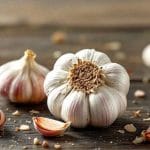Your cart is currently empty!
Takeaways
- Niacin, or vitamin B3, may help reduce allergy symptoms
- It has potential anti-inflammatory and antihistamine properties
- Niacin could benefit various allergy types, including seasonal and skin allergies
- Proper dosage and administration are important for effectiveness and safety
- Combining niacin with other treatments may enhance allergy relief
- More research is needed to fully understand niacin’s role in allergy management
Understanding Niacin
Niacin, also called vitamin B3, is a water-soluble nutrient essential for various bodily functions. It exists in three main forms: nicotinic acid, niacinamide, and inositol hexanicotinate.
Each form of niacin functions differently within the body. Nicotinic acid primarily influences cholesterol levels, niacinamide supports cell processes, and inositol hexanicotinate provides a slow release of niacin.
Niacin participates in over 400 enzyme reactions, aiding in energy conversion from food, DNA repair, and hormone production. These crucial functions highlight niacin’s importance for overall well-being1.
Niacin and Allergies: The Connection
The potential connection between niacin and allergy symptoms is a topic of interest. Research indicates that niacin might help lessen allergic reactions because of its anti-inflammatory qualities.
Niacin may alter how the immune system responds to allergens. It could potentially reduce the release of histamine, a compound that causes typical allergy symptoms.
Niacin might help manage various allergy symptoms, including:
- Sneezing
- Runny nose
- Itchy eyes
- Skin rashes
- Congestion
Niacin’s impact on the immune system is intricate. It may adjust the activity of specific immune cells, which could lead to a reduced allergic response.
How Niacin Works Against Allergies
Histamine Regulation
Histamine is central to allergic reactions. When exposed to an allergen, the body releases histamine, causing various allergy symptoms.
Niacin may affect both histamine production and release. Research suggests that niacin could lower histamine levels in the body, potentially reducing allergy symptoms.
Studies exploring niacin’s impact on histamine are ongoing. One study found that niacin reduced histamine levels in rats2, but further research in humans is necessary to confirm these findings.
Anti-Inflammatory Action
Inflammation is a major aspect of allergic reactions, leading to swelling, redness, and discomfort. Niacin shows potential in reducing inflammation through several biological processes.
Niacin may lower the production of pro-inflammatory molecules while increasing the activity of anti-inflammatory ones. These combined actions could help alleviate allergy symptoms.
Here is a comparison of how niacin’s anti-inflammatory effects differ from common antihistamines:
| Aspect | Niacin | Common Antihistamines |
|---|---|---|
| Mechanism | Reduces inflammation, may lower histamine | Block histamine receptors |
| Onset of Action | Gradual | Rapid |
| Duration | Long-lasting | 4-24 hours, depending on type |
| Side Effects | Flushing, itching | Drowsiness, dry mouth |
Niacin significantly influences inflammatory markers. It can reduce levels of C-reactive protein, an inflammation indicator, suggesting niacin’s ability to manage allergy-related inflammation3.
Types of Allergies Niacin May Help With
Niacin could potentially benefit different types of allergies. Its effects may extend to various common allergic conditions. Let’s explore how niacin might help with specific allergies.
Seasonal Allergies
Seasonal allergies, also known as hay fever, affect a large number of people. Niacin might help manage these symptoms. Its anti-inflammatory properties could lessen nasal congestion and sneezing.
Niacin may work well with other seasonal allergy treatments. For example, it could boost the effectiveness of antihistamines. This combination might offer more symptom relief than either treatment alone.
Food Allergies
Food allergies occur when the immune system reacts to certain foods. These reactions can vary in severity. Niacin’s potential in managing food allergies is currently being researched.
Niacin could possibly decrease the severity of food allergy symptoms. Its anti-inflammatory effects might reduce skin reactions or digestive problems. However, niacin is not a replacement for avoiding the problem food.
Skin Allergies
Skin allergies appear as rashes, hives, or eczema. Niacin’s role in skin health makes it a potentially useful option for these conditions. It may help to reduce symptoms and improve skin barrier function.
Niacin might offer benefits for several skin conditions related to allergies, such as:
- Atopic dermatitis
- Contact dermatitis
- Urticaria (hives)
- Angioedema
Topical niacin products may provide localized relief by reducing inflammation and itching associated with skin allergies4.
Dosage and Administration
The correct niacin dosage is important for managing allergy symptoms. The right amount can maximize benefits while minimizing side effects. It is best to consult a doctor before taking any niacin supplements.
Niacin supplements are available in different forms, each with a different absorption rate and potential effects. The most common forms are immediate-release and extended-release niacin.
Here’s a comparison of common niacin supplement types:
| Form | Absorption | Potential Side Effects | Best For |
|---|---|---|---|
| Immediate-Release | Rapid | Flushing, itching | Quick action |
| Extended-Release | Slow | Liver stress | Sustained effect |
| Niacinamide | Moderate | Minimal flushing | Sensitive individuals |
The dose of niacin for allergy support varies, depending on the individual and the type of allergy. A typical range is between 500 to 2000 mg per day, divided into multiple doses. Start with a low dose and gradually increase.
It’s important to remember that more is not always better. High doses of niacin can lead to side effects like liver problems and elevated blood sugar. Always follow your doctor’s advice.
Potential Side Effects and Precautions
Taking niacin supplements can cause side effects, so being aware of them is important for safe use. The most frequent side effect is the “niacin flush.”
The niacin flush causes temporary redness and itching, usually on the face, chest, and arms. Although it is harmless, it can be uncomfortable. This flush typically goes away with regular use.
To minimize potential side effects while taking niacin, consider the following:
- Start with a low dose
- Take niacin with meals
- Avoid hot drinks and alcohol when taking niacin
- Consider taking an aspirin 30 minutes before niacin
- Use extended-release forms if flush is severe
Monitoring liver health is important when using high doses of niacin. Regular blood tests can detect liver issues early, which is especially important for people with pre-existing liver conditions.
Certain individuals should avoid niacin or use it with caution. This includes those with specific health concerns like:
- Liver disease
- Peptic ulcers
- Gout
- Diabetes
- Pregnancy or breastfeeding
Always inform your doctor about all medications and supplements you are using. Niacin can interact with certain drugs, including blood thinners and diabetes medications.
Combining Niacin with Other Allergy Treatments
Niacin may improve the effectiveness of common allergy treatments. This combined approach could provide improved symptom relief. However, careful usage is important when combining different therapies.
Niacin and antihistamines may work well together. Niacin could reduce inflammation while antihistamines block histamine. This dual action might result in more comprehensive allergy relief.
Natural remedies that might complement niacin for allergy relief include:
- Quercetin
- Vitamin C
- Omega-3 fatty acids
- Probiotics
- Local honey
A comprehensive approach to managing allergies is often the most effective. This approach may include changes to your diet, stress reduction, and environmental adjustments. Niacin can be part of this wider strategy.
Discuss all treatments with your doctor to create a safe and effective allergy management plan. This plan should address your particular allergies and overall health.
Dietary Sources of Niacin
It is possible and beneficial to get niacin from food. Many foods contain varying amounts of niacin. Adding these foods to your diet may help with allergy symptoms.
Niacin from food could help reduce allergy symptoms. However, the amounts are generally lower than those found in supplements. Still, a diet high in niacin can support overall health and the immune system.
Top niacin-rich foods to include in an allergy-friendly diet:
- Chicken breast
- Tuna
- Turkey
- Salmon
- Peanuts
- Avocado
- Brown rice
- Whole wheat bread
Getting enough niacin from diet alone can be challenging. The daily recommended intake is 14-16 mg for adults, but some might need more for therapeutic effects.
Consider both food sources and supplements to ensure optimal niacin intake. A balanced strategy ensures adequate niacin and other nutrients, supporting both general health and potentially helping with allergies.
Research and Studies on Niacin and Allergies
Current research into niacin’s role in allergy management is promising. Studies suggest niacin might help reduce allergy symptoms. However, more research is necessary to fully understand the impacts.
Multiple studies have shown the potential of niacin in allergy treatment. One study found niacin reduced nasal symptoms in those with hay fever5, and another suggested niacin might help with skin allergies6.
Despite promising findings, there are gaps in knowledge. More large-scale human trials are needed to focus on:
- Optimal dosages for allergy relief
- Long-term effects of niacin supplementation
- Interactions with other allergy treatments
- Effectiveness for different types of allergies
Researchers are also studying how niacin works in the body. Understanding how niacin affects allergic reactions may lead to more effective treatments. This information might also help identify who would benefit most from niacin supplements.
Future research may examine niacin’s ability to prevent allergies. Some scientists believe that niacin could help regulate the immune system, possibly lowering the likelihood of developing allergies.
As research progresses, our understanding of niacin and allergies will improve. This knowledge could lead to new and better allergy treatments, as well as more effective use of existing methods.
FAQ: Common Questions About Niacin and Allergies
People often have questions about using niacin for allergies. Here are answers to some common queries. These answers should assist you in making informed decisions about using niacin.
Can niacin cure allergies?
How long does it take for niacin to help with allergy symptoms?
Is niacin safe for children with allergies?
Can I take niacin with my current allergy medication?
Are there any allergies that niacin won’t help with?
Conclusion
Niacin has potential to alleviate allergy symptoms. Its anti-inflammatory and antihistamine properties make it a possible option for allergy management, from seasonal allergies to skin conditions.
Niacin is not a single solution, but rather one part of a broader approach to managing allergies. Combining niacin with other treatments and changes in lifestyle often yields the best results, leading to better symptom control and overall health.
Keep in mind that every person’s body responds differently. What works for one person may not work for another. This is why it’s important to seek personalized advice. Always talk with a healthcare provider before using niacin for allergies. They can help determine if it’s right for you and guide you on correct usage.
As research continues, we will learn more about niacin’s role in treating allergies. This knowledge will help refine how we use niacin and other treatments. It could also lead to new and more effective ways to manage allergies.
In the meantime, think of niacin as one option in your allergy management strategy. When used wisely and with medical guidance, it might help you breathe easier and have fewer allergy symptoms.
1. Gasperi, V., Sibilano, M., Savini, I., & Catani, M. V. (2019). Niacin in the Central Nervous System: An Update of Biological Aspects and Clinical Applications. International Journal of Molecular Sciences, 20(4), 974. https://www.ncbi.nlm.nih.gov/pmc/articles/PMC6412771/
2. Worm, M., Fiedler, E. M., Dölle, S., Schink, T., Hemmer, W., Jarisch, R., & Zuberbier, T. (2009). Exogenous histamine aggravates eczema in a subgroup of patients with atopic dermatitis. Acta Dermato-Venereologica, 89(1), 52-56. https://www.medicaljournals.se/acta/content/abstract/10.2340/00015555-0565
3. Pei, Y., Jiang, R., Zou, Y., Wang, Y., Zhang, S., Wang, G., … & Qi, X. (2016). Effects of Nicotinamide-Mediated Inhibition of SIRT1 on Pancreatic β-Cell Function and Mass. Journal of Cellular and Molecular Medicine, 20(9), 1803-1817. https://www.ncbi.nlm.nih.gov/pmc/articles/PMC5021688/
4. Niren, N. M. (2006). Pharmacologic doses of nicotinamide in the treatment of inflammatory skin conditions: a review. Cutis, 77(1 Suppl), 11-16. https://pubmed.ncbi.nlm.nih.gov/16871774/
5. Prousky, J., & Seely, D. (2005). The treatment of migraines and tension-type headaches with intravenous and oral niacin (nicotinic acid): systematic review of the literature. Nutrition Journal, 4, 3. https://www.ncbi.nlm.nih.gov/pmc/articles/PMC548495/
6. Chen, A. C., Martin, A. J., Choy, B., Fernández-Peñas, P., Dalziell, R. A., McKenzie, C. A., … & Halliday, G. M. (2015). A Phase 3 Randomized Trial of Nicotinamide for Skin-Cancer Chemoprevention. New England Journal of Medicine, 373(17), 1618-1626. https://www.nejm.org/doi/full/10.1056/nejmoa1506197
Last medically reviewed and fact checked on
Colors Nutrition does not provide medical advice, diagnosis, or treatment.




